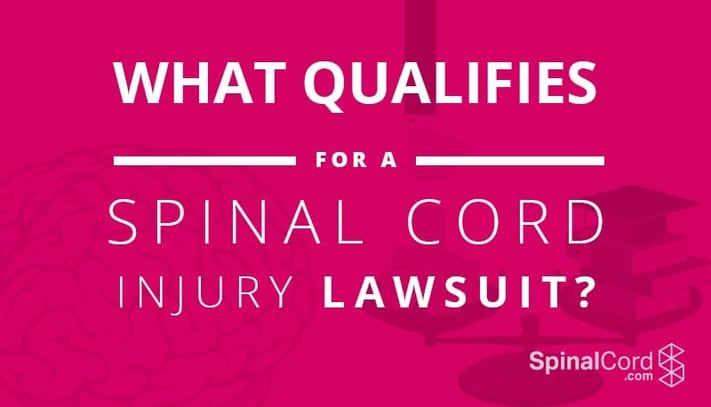What Qualifies for a Spinal Cord Injury Lawsuit?

A lot of confusion swirls around the world of lawsuits, especially lawsuits involving catastrophic injuries. In the popular consciousness, anyone can sue anyone else for just about anything. In reality, anyone can file a lawsuit but not everyone should. It is challenging to keep lawsuits from being dismissed, and very challenging to win them. Given the high costs of a spinal cord injury—over a million dollars in the first year of high tetraplegia—it's no wonder that those who suffer from a SCI may be interested in filing suit to recover their expenses.
To determine whether you are eligible to file a lawsuit, your best bet is to talk to a skilled spinal cord injury lawyer. You can also ask yourself these questions to understand if your case includes some of the legal basics.
Who is Responsible for the Injuries?
Lawsuits don't arise from nothing. To be able to file a suit, someone else must be responsible for your injuries. Of course, the responsible party isn't always clear, and sometimes you can sue even if you injured yourself. For instance, if a gun misfired and led to a spinal cord injury, you might still be able to sue the manufacturer if you can prove that they were negligent in manufacturing the gun.
Generally speaking, you must prove that the other party was negligent, by failing to meet a clear duty. A doctor who doesn't properly treat a spinal cord infection might have negligently committed malpractice. If you can't prove negligence, then you must prove that the other party intentionally acted to harm you. A criminal who caused your spinal cord injury by shooting you fits this bill. Some of the most common defendants in spinal cord injury lawsuits include:
- Doctors and other medical providers who do not provide appropriate care.
- Manufacturers of devices, such as guns or seat belts that malfunction.
- Businesses that do not provide a sufficiently safe environment, such as a bumper car racing facility that provides patrons with dangerous equipment.
- Businesses whose employees engage in dangerous behavior. For instance, a business might be liable if an employee attacks you.
- People who injured you, such as a person with whom you got into a car accident.
Did Someone Make the Injuries Worse?
Sometimes, liability is not a clear issue. Maybe no one is liable for your original injury, but someone made the injury worse. This might occur when a doctor fails to timely treat your injuries, or a business owner deliberately interferes with your ability to get to the hospital.
Many spinal cord injury lawsuits involve multiple parties. You can sue all of the parties who played a role in your injury, and even if someone is not clearly liable for the initial injury, you may be able to sue if a subsequent person did something to make the injuries worse.
Can the Responsible Party Afford to Pay?
Spinal cord injuries are not cheap, and this is a major consideration when filing a lawsuit. People sue individuals for relatively inexpensive civil offenses every day. But the odds that an individual will be able to afford the costs of a spinal cord injury are vanishingly slim. If you were injured by an individual, and that individual is not covered by insurance, it might not matter how much you win. You could spend the rest of your life garnishing small sums of money in an attempt to recover all that you have lost.
Skilled spinal cord injury lawyers often endeavor to get around this by finding another party. For instance, your lawyer might sue a manufacturer instead of the person who owned a defective product, or he or she might sue a business rather than the employee who injured you.
Could Other Legal Issues Play a Role?
Even when your injuries are severe and you can clearly show that the other party caused them, your suit still might not be winnable. Only a lawyer can evaluate the validity and success potential of your claim, but some common issues include:
- Statute of limitations: If your claim is past the statute of limitations, you cannot file it, so you must act quickly.
- Legal precedent: A range of court cases address which cases can and cannot be filed. The issues are often complex and esoteric, so many cases require years of motions before a trial can even happen.
- Evidence: You must be able to prove that your injuries were caused by the other party, and that they did not predate the incident.
To learn more about spinal cord injury lawsuits, click the button below to download our free guide, or click to chat to speak with someone who can answer your questions right away.
Stay Updated on Advancements On Traumatic Brain &
Spinal Cord Injuries
About the Author





